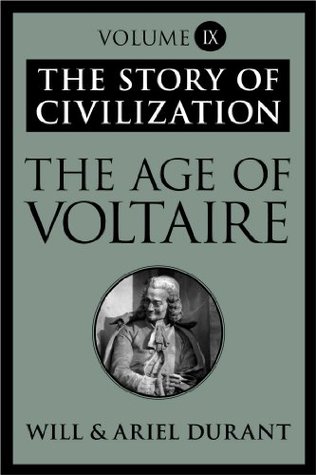More on this book
Kindle Notes & Highlights
by
Will Durant
Read between
September 26 - October 11, 2019
Vincent de Gournay, toward 1755, uttered the historic phrase “Laissez faire” (Let it alone), which in the next generation, with Quesnay and Turgot, would express the physiocrat plea for free enterprise and free trade.
He had a good mind, which might have excelled if supported by character.
Wei and 1 other person liked this
“Il ne s’agit pas de vivre, mais de partir” (The important point is not to live but to set out).
Samuel Burleigh liked this
“Après moi le déluge.”
Her household expenses ran to 33,000 livres per year.117 France condemned her as costing more than a war.
She was probably the most cultured woman of her time. She had a library of 3,500 volumes, 738 of them on history, 215 on philosophy, many on art, some on politics or law, several romances of love.
“It is his heart that I grudge,” she told Mme. du Hausset, “and all these young women, who have no education, will not rob me of that.”
Public opinion, except in the middle classes, was lenient to such women; it knew that many nobles, clerics, and other pillars of society helped to create the demand that generated this supply; and it had the decency to condemn the poor vendor less than the affluent purchaser.
Jealousy was bad form.
Voltaire warned his countrymen in 1749 that their heavy repasts would “eventually numb all the faculties of the mind”;
find the woman whom the man loves, and you find the way to your man.
Voltaire, from Geneva, assured her that her wit was even brighter than her eyes had been; he encouraged her to go on living if only to enrage those who paid her annuities.
Wei and 1 other person liked this
It was a brilliant age because the women in it were brilliant, combining brains with beauty beyond any precedent.
Samuel Burleigh and 1 other person liked this
Even blunt and cloudy Diderot confessed: “Women accustom us to discuss with charm and clearness the dryest and thorniest subjects. We talk to them unceasingly; we wish them to listen; we are afraid of tiring or boring them. Hence we develop a particular method of explaining ourselves easily, and this method passes from conversation into style.”
Wei and 1 other person liked this
Woman, once a sin, proclaimed herself still a sin, but only to be more tempting; she revenged herself on those frightened centuries in which she had been humiliated by the Church as the mother and agent of damnation, and had been admitted to a eunuch-conceived Paradise only through the virginity of the Mother of God. Nothing could more boldly announce the decline of religion in France than the displacement of the Virgin in French art.
Wei liked this
Diderot denounced his “simperings, affectations, … beauty spots, rouge, gewgaws, … frivolous women, libidinous satyrs, bastard infants of Bacchus and Silenus.”
Samuel Burleigh liked this
“I have spoken too much evil of Boucher,” he said; “I retract.”
it was Chardin’s intense feeling, as well as his intent vision—and his poverty—that made a lyric of the larder, an epic of a menu.
It is the most wholesome art in all of art’s history.
“I am a body and I think; I know no more.”
man, he proclaimed, “is born for action.… Not to be employed, and not to exist, are one and the same thing with regard to man.”
It was a declaration of war and a map of campaign.
Lafayette said it made him a republican at the age of nine.
“It is frightful,” he said, “the time we spend in talk. We ought not to lose a minute. The greatest expenditure we can make is of time.”
Her Traité de la bonheur was an original discourse on the foundations of happiness; these, she thought, were health, love, virtue, rational self-indulgence, and the pursuit of knowledge.
“That which our eyes and mathematics demonstrate to us,” he wrote in 1741, “we must hold to be true. In all the rest we must say only, ’I do not know.’”
“My dear father Adam, confess that you and Madame Eve had long nails black with dirt, and that your hair was a bit out of order.… In vain have scholars sought to locate the Garden of Eden; … the terrestrial paradise is where I am.”
There is a dangerous age in men as well as in women; it lasts longer, and commits incredible follies.
History is a contest between art and war, and art plays the part of Sisyphus.
The ruling classes were as loath as the monks to wait for a heaven beyond the grave.
From the birth of Handel and Bach in 1685 to the death of Brahms in 1897 German music was supreme; at any time in those 212 years the greatest living composer, except in opera, was a German.
Orphean stream.


